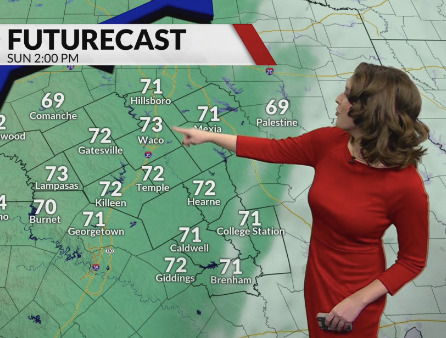The Seven Day Forecast

The Lady In Red is the name Splash assigned to the skilled meteorologist on the flat screen who appears each afternoon. She appears in the bundle of jumbled information each afternoon and gives us a taste of what to expect from the skies above in the week ahead.
She claimed something extraordinary for this summer season now ending: “No rain in the seven day forecast!”
That is useful information, even if we can’t do much with it. The lush foliage on the other side of the pasture fences is showing signs of change. Parts are no longer bright green. There are small gaps in the overage of the leaves that allow glints of light through a cover that had seemed inexorable. There was no information about whether the subtle alteration in the view is a product of the earth’s orbit, or a slightly cooler summer season. Or maybe it was the effect of more rain.
The Lady in Red only mentioned the slightly cooler part, leaving us to speculate about the causes of the weather. We have had some predictable answers to that since we were young and optimistic. We remember the first Earth Day, the one 52 years ago. The term “ecology” was still new then. We were excited about it, since it provided a scientific basis for alarm and distrust for the older people who created the world in which we lived.
There were some firm predictions voiced at the time. If you are old enough, you may remember some of them. The torrent of apocalyptic predictions were exciting, and convinced many of us that if we did not take immediate and dramatic action to change the way we live there was going to be real trouble.
That turned out to be the only prediction that was accurate, and we naturally have adjusted with the annual updates. We all recall preparing for the coming Ice Age, which was going to arrive shortly after college graduation and make our career choices include parkas. Rocket still wears the hoodie he bought back then in the regular transition from t-shirt to sweater weather. Loma is still convinced that the environmental crisis will end civilization by 1985 or Y2K at the latest. He defies us to convince him he is wrong.
We had a couple warm summers around then, and we came to general agreement that incineration of some sort was inevitable. Some of us quit smoking, although others refused to give up the grill, since it would be useful in the transition to a renewable energy future when there wouldn’t be any.
DeMille, our ostensible section leader, is not convinced that Peak Oil happened yet and continues to use the somewhat battered Ford F150 to get to town. He no longer picks up a copy of what we used to call the “newspaper,” or even what used to be weekly “newsmagazines,” since the shelf life on them is shorter than the drive back to The Farm. Or sometimes the walk back to the truck.
There used to be a functional spectrum for using the things, except for the magazines whose pages were too slippery for use as wrapping or absorbent purposes. The digital information we get now doesn’t absorb anything, but the larger argument is that we don’t either.
What was important about the forecast from the Lady in Red was that there would be no moisture from the skies at least until we forgot what was on the news.
Copyright 2022 Vic Socotra
www.vicsocotra.com
